Joshua Graham's Blog, page 12
July 15, 2013
Thrillerfest 2013

The truth is, I didn't feel quite up to making the cross-continental trek from California to New York last week. It meant waking up at 3AM to get to the airport on time, then going through TSA scans and frisks, and then packing myself into a sardine can, only to fly through white-knuckled turbulence which would make any atheist convert (until they made it through, anyway.) Most of all, it meant leaving my family, with whom I'm very close.
But I did it, out of diligence.
You see, even though I knew it was going to be great to see writers and other people in the industry whom I both admire and respect, I was tired and uncertain what to expect. Being a writer, you can get stuck in your own little world and lose perspective. As I've said many times, it can be a lonely business.
But as soon as I arrived, I knew things were going to be great. I met up with some wonderful friends that I'd met last year, and some colleagues with whom I hadn't heard from for some time.
This year, I met some wonderful debut authors such as T.L. Costa, and Landon Parham. There's just too much to report, so I'll just leave off with thanking all the wonderful people who were so kind to meet up and speak with me. But most of all, I want to thank Jeff Ayers (aka the Thrillerfest Mayor) for taking the time to hang out with me and connect me with some fantastic new friends! And make sure you check out his debut noel LONG OVERDUE.
Here are some memorable moments at Thrillerfest 20013
Me and my long lost cousin Heather Graham. Note the family resemblance.
The last reception with good friends, old and new.
This is not an original photo, I hate to say. It represents about an hour's worth of photoshopping compliments of the nice ladies have the distinction of photobombing this lovely shot.
So that I don't leave you completely in suspsense, here is the original:
Did you attend Thrillerfest 2013? Please share your favorite moments in the comments.
July 5, 2013
Zombie Virus Possible?
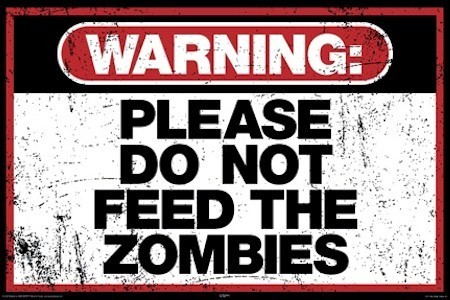
I was never really a fan of zombie stories in books or movies. Watching re-animated corpses go cannibalistic was just never interesting to me in terms of entertainment. Perhaps, for some reason, I thought these stories were "supernatural" in nature, making it creepy on both the physical and spiritual levels. But then, I learned that it could also take on a SciFi, or speculative fiction angle, as it did in I AM LEGEND, and it didn't necessarily involve reanimation of corpses.
Still, it was a little creepy and I don't particularly enjoy watching all the gory stuff involved.
I came across this article on National Geographic, though, that really made me think, "What if some kind of virus spread that turned people into violent, enraged, animals, at an epidemic level?" Could never happen, right? But in theory, according to this article, it could--though very unlikely.
http://news.nationalgeographic.com/news/2010/10/1001027-rabies-influenza-zombie-virus-science/

It would be bad enough if there was a widespread outbreak of rabid animals, but what if?
What's your big irrational fear that gives you the creeps just thinking about it? Do you like books and movies about them? Why or why not? Let me know in the comments section below.
July 4, 2013
What, No Helmet?

This Fourth of July as I watch the fireworks going off, I’m reminded of my childhood when it wasn’t quite illegal for us to use firecrackers, bottle rockets, and even M80s. Were they scary? Sometimes, and yet my parents never forbade us to use them.

I grew up in the 70s and looking back, it's a miracle I survived. I never even heard of a helmet for riding a bike, and I'd ditched my training wheels at the tender age of four. We could ride around the neighborhood all day without our parents even questioning where we were going.
As for fireworks, we’d heard the horror stories of kids getting their fingers blown off because a fuse had been too short, etc. When I was in first grade, I even remember hanging out at my friend’s house and trying to light a firecracker. To my shock, the entire book of matches ignited in my hand!
Right away, my friend’s helpful grandpa ran into the house, came back with a stick of butter, and slathered it all over my palm. Didn’t they know back then that that was BAD? Suffice it to say, I received what would be considered a 2nd degree burn, and for a week the palm sized blister on my hand resembled the soft white pads on the bottom of my cat’s paws.

I don’t know if my parents had gotten upset about it, they never showed it, nor said anything to me about it besides, “Be more careful.” And for the rest of my childhood, until the charm wore off, I and my maniacal brothers continued to play with fireworks, creating all kinds of mini-IEDs for blowing up ants, bugs, and making tiny rockets.
As I said, it’s a miracle we survived, because I would never allow my kids to do some of the stupid things I did. Who knows, it could have been my fingers that got blown off and I would never have been able to play the cello and go to Juilliard.
Now that I’m a parent, I might be a bit on the overly cautious side. And some of my more casual acquaintances think I’m too uptight about health and safety. But my philosophy is, if it doesn’t cause too much inconvenience, or deprive my child of a healthy life experience, then by principle, take the prudent path of caution.
Some of you know that a couple of years ago, a good friend of mine named Jimmy died in a scuba diving accident. Jimmy was a very experienced diver, and a former member of the US Navy. He knew what he was doing. And he’d probably gone diving solo more than once, though everyone knows you shouldn’t go alone. For him, it was probably a million in one chance anything could go wrong.
But it only took that one time, and nothing could bring him back to the people who loved him and whom he left behind.
My whole family was heartbroken, my children in particular, as they loved him like an uncle.
So a principle arose in our household. If that one in a million chance involves irreversible consequences, and the risk isn’t absolutely necessary, then go by the principle: “Health and safety first.”
What do you think? Am I too uptight? Do I need to relax more?
What about you? What kind of dangerous/reckless things did you do as a child that you’d never let your kids do?
Leave a comment below and tomorrow I’ll randomly select one person to win a free ebook of mine.
PS: Have a safe and happy fourth!
July 3, 2013
You, A Time Traveler?


Some time ago, I read Stephen King's 11/22/63, a book in which Jake Epping, a thirty-five-year-old high school English teacher comes upon a time portal which can take him back to the 1960s. Among other things, he decides to take on a mission to stop the assassination of John F. Kennedy.
It got me thinking about the ethics of such an endeavor, if were possible. If you could actually go back in time and stop something from happening, it could potentially save lives, prevent atrocities, etc. But then, who knows what the far-reaching effects altering the timeline would be? Would the world as we know it exist when we return from our mission? Would it be better, worse, unchanged?
Given the risks, would you still embark on such a mission if you had the power to do so?
If I had the power to go back in time and stop one disaster or atrocity from happening, it would be the Massacre of Nanking in 1937. Yes, there have been other such genocidal war crimes, but this one was particularly barbaric, considering what they did not only to the hundreds of thousands of innocent women, but to children and infants.
So, if there was one disastrous event you could go back in time and prevent, what would it be? Please discuss in the comments section at the bottom of this page.
June 26, 2013
My First Real Plight…I mean, Flight!


After my initial flights of my Hobby Zone Champ RC airplane, which resulted in a few minor crashes and broken wings, I was grateful for 6 -Minute Epoxy--which smells pretty awful--but made the wing stronger in the repaired crack and made it stronger than the rest of the wing itself. It looked fairly decent after repair, but the question remained: Will it fly?
Fast forward a few days for the answer...
It did! However, the wind that day was pretty rough for a little trainer plane like mine. I found myself requesting help from my son (who bought this plane for me as a Father's Day gift). He took the controls and landed it safely. Relieved, I once again took to the air.
Again, the wind took my plane out of control. But this time, my son was busy flying his plane and unable to assist.
No matter how I tried, it couldn't fight against the breeze hard enough to turn back into the field--these planes are not designed for flight in windy conditions. I managed to turn it around, but then it went behind a tree.
"Oh no," I muttered, while my son tried to land his plane and assist me. As my plane rounded its turn back toward the field, it flew right into the branches of a tree. There, it stopped cold. The control surface servos were responding (rudder, elevators) and thrashing about, and I could still hear the propeller spinning as I pushed the throttle. But no amount of spinning the props could free it.
The prop, wings, and landing gear were wedged between the leaves and branches!
Eventually, the prop stopped responding because it was stuck.
Forty feet up in a tree, which I could not climb--nor would I, even if I had a ladder.
I kept hoping the wind would blow hard enough to dislodge it from the branches, but it was too light to do much more than make the entire branch clutching my plane sway gently.
My son offered to fly his plane into mine and ram it free, but I told him not to. No sense in getting his beautiful P-51 caught or damaged trying to free my plane. Feeling helpless, I walked around the field, gazing up at the pathetic orange "Champ" stuck like a kitten high above the ground. Then, in the periphery, I caught a glimpse of something round and white.
Why, it was a baseball!
LIGHT BULB...
Daring to hope, I walked up behind the tree and thought, if I can just hit the branch, maybe it will shake loose.
My first throw was anemic, I have to admit. I was afraid of smashing my little foam plane into pieces if I threw it too hard.
Well, the ball just kind of lobbed way to the left, and missed the tree utterly by--oh, a healthy margin of about 10 feet. That was embarrassing. I used to be pretty good at baseball, back in the Paleozoic era.
A few more attempts.
Too high...
Too low...
Too long, too short, not even close...
It was going to take a lot more than strength to nail that sucker! Imagine you're at the carnival, and your about to play that game where they give you a baseball and you have to knock down only the top most milk bottle in a stacked pyramid of milk bottles. Now imagine that the bottle is forty feet above your head! That's how impossible it seemed to me.
Again, my son offered again to ram my plane down. Again, I decline.
Getting discouraged, I walked to the tree again (after playing fetch with myself ad nauseum) and blinked, all prospects of retrieving one of my favorite Father's Day gifts dwindling. It seemed I must prepare myself to leave the plane there and go home wondering who the lucky person would be that found it, when one day the leaves and branches finally died and broke off.
Then I thought, "Why don't you pray?"
Right. Pray about getting a toy back.
Again, I thought, "Childlike faith. Isn't that what Jesus said we need?"
Ok, why not? If ever I was put into practice the belief that no problem is too great or too small for God, now was the time. It felt funny to pray, "Please, God. Help me get this plane back. I know it's just a toy, and it's replaceable, but it's a special gift from my son." I grinned at myself for praying that, because I was completely sincere.
Guess what happened next?
The wind started blowing again.
Really hard this time. Hard enough for my son to remark, "Hey Dad! The wind!"
The tree began to swing its limbs.
The plane spun around a full 180.
The preacher in me said, "In the name of Jesus! Come down, thou plane of remote control!" :) Seriously, I said something like that. Under my breath, though, there were people in the tennis court right behind me and I didn't want to completely freak them out.
But then, even though the plane had swiveled a full 180, the wind stopped. The tree branch stopped moving too. And as quickly as it had come, the wind was gone. But my faith was still high. I wasn't about to give up without a fight. I prayed quietly, asking what I should do--give up, or try something else.
Right away, at that moment, a mental image of Moses leading the people in the wilderness, parched from thirst with no water to be found. He's there at the rock and God says to him:
Behold, I will stand before you there on the rock at Horeb, and you shall strike the rock, and water shall come out of it, and the people will drink.” And Moses did so, in the sight of the elders of Israel. --Exodus 17:6 ESV
Before I had a chance to doubt, I picked up the baseball. Focused my eyes on the center of the plane's wings, and threw the ball.
Direct Hit!
The ball struck the plane right between the wings.
The left wing broke off. But that is exactly what needed to happen to free the entire plane, which slowly tumbled to the ground. When it landed in the grass, aside from the wing, it was unscathed. Everything was operational. About 6 seconds later, like a helicopter leaf, the snapped off wing came floating down.
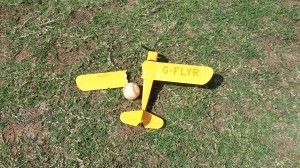
I could hardly believe it. After all my failed attempts at knocking the plane down with the baseball, I would never have tried again, had not that thought come into my mind. But there it was. A perfect pitch, forty feet into the air, hitting a target (the center of the wings) that was about 6 inches in diameter. I don't have that kind of skill, believe me. It was a gift from heaven above that helped me retrieve the gift from my son down here on Earth.
By the way, I repaired the Champ again (it's now had its wings broken and repaired four times) and I flew it better than ever before today!

This video was shot today by my son, who is the one making the remarks as I fly.
httpvh://youtu.be/Puw3v3mxQ3o
June 25, 2013
Joshua Graham Interview on Author in the Headlights
I had the pleasure of being a guest on Author in the Headlights recently, hosted by Jason P. Stadtlander
We had a great time talking about writing, life, books, and other rather personal topics.
Please check it out here:
httpvh://www.youtube.com/watch?v=FZ-9QkoZkS4
And while your at it, please check out Jason's website and books as well here: http://www.jasonpstadtlander.com/books/
June 4, 2013
Guest Blogger Michael Hiebert: Researching Your Novel: When Wikipedia No Longer Cuts It

I've had the honor and privilege of knowing Michael Hiebert since the early years of my writing career. He's a consummate author and a great friend. So when he offered to be a guest blogger, leaped at the opportunity to have him grace my blog. I know you'll find his insights as intriguing and beneficial as I do.

Researching Your Novel: When Wikipedia No Longer Cuts It
by Micheal Hiebert
There are normally two pastures full of people with a fence cutting a swath down the center, and people are either on one side of the fence or the other. I don't know of anyone actually sitting on the fence when it comes to researching their books. You either love researching, or you loathe it.
People who love researching run the risk of getting so enamored with their research project that they never actually start writing their novel. They just keep researching as more and more new avenues to go down present themselves.

People who hate researching run the risk of not doing enough of it and, especially when it comes to scientific, or historical fantasy, run the risk of writing a trite, clichéd novel that takes place in a version of the environment that Hollywood has shoved down our throats and shows no actual resemblance to reality at all.
Both are equally bad, so try to avoid them.
Learn to “like” the research process, but don’t fall in love with it. In fact, if you can, set a time limit for yourself when you first set out to start researching your novel, say, six months (or more, or less, depending on factors like how complex your book is and how much knowledge you already have about the subject you’re writing about). And, at the end of that time limit, make a very strong judgment about whether or not you should stop researching and start writing. Remember, just because you’ve started writing, doesn’t mean your research has to end. You can do both at once.
Yet another Caveat
The more fascinated you are by the time period you've chosen to write your novel in, the more careful you need to be. Always remember, you're writing a novel. Your reader expects a novel. She doesn't expect a history book. Story has to come first. Avoid the urge to lay out a lengthy treatise about the Crusades, or jousting, or anything else that takes away from the story and is only there because you enjoy writing about it.
Consider the research as a frame for your story that enhances it. The characters and their plights within that frame are what is important. That's where most of your time should be spent while writing. Focus your energy on your story. Don't make the frame so elaborate that it detracts from what's important.
Different Methods of Researching
The traditional method of researching is still one of the best: read a lot of books. Be careful of the books you read, though. Books take time to get through, and you want to make sure you are reading books written by people considered to be experts on your topic. How do you find these “experts”?
Well, the good news is, you only need to find one. And generally, a night spent flipping through Amazon pages and reading reviews and book descriptions will unearth the one book that everyone else compares themselves too. This is the book you want to start with.
As you read, take careful notes, and especially make notes of any sideline topics that are indirectly connected to your subject that you hadn’t been aware of before. You’re going to want to follow these leads, too. But by far, the biggest thing you want to do while reading this “expert” book is write down all the references to other books he or she makes throughout the text. These other books will become your next big source of information to go to, because, if the author of this book really is an “expert” on your subject, he’s only going to be drawing from books that he respects and are probably written by other experts in the field.
So you’re going to come away from this first book with a pile of notes, a longer list of subjects indirectly connected to your main subject, and a list of books to read next. And the feeling that your research workload has just gone up exponentially, because it has.
Let me give you a real life example.
The book I am currently writing is about the Cathars and the Inquisition in fourteenth century southern France. When I began, things didn't seem that complex. I thought I had four major subjects to study and really, the top two overlapped:
• Cathar Beliefs
• Cathars
• Inquisition
• Medieval Europe
I knew very little about any of them, but, luckily, I found the book on Catharism that everyone on Amazon compared their books to. It was In its tenth printing. It was obviously a very popular and respected book, so I purchased it.
And I read it.
Next thing I know, I was being led places I never expected to be going. The more I read, the more I realized this book I was writing couldn’t be constrained to knowledge encompassing just my four subjects. This Cathar/Inquisition matter touched upon a lot more than just those few things.
So, as I finished reading that first book, my list of subjects had exploded from four to sixteen. It now looks like this:
• Ark of the Covenant
• Assassins' Creed
• Cathar Beliefs
• Cathars
• Christianity
• Freemasons
• Heretical Scriptures
• Holy Grail
• Inquisition
• Knights Templar
• Medieval Clothing
• Medieval Europe
• Medieval Vernacular
• Rosicrucians
• Vatican
• Vocabulary
If it grows much more, it will become truly unwieldy. But to truly understand my subject and write the book I want to write, I need to have more than just a lay understanding of all these points. Oh, and in case you're wondering, Vocabulary is a heading for words I encounter as I go that were in use in the thirteenth and fourteenth century, which is very much like the topic Medieval Vernacular, where I am listing any specific dialogue I come across that points toward how they spoke in Medieval Europe. I know very little about the time period this book is being set in, so that is another area I have to concentrate my research.
Other Ways to Research
Traditional books aren’t the only avenues of research available to you, of course. And you certainly don’t have to purchase all your books on Amazon. I just like owning the books I use for research so I can refer back to them. It also comes in handy when my editor asks for another book in that same universe. So I buy my books, but not always brand new. I also look for them at second hand shops, flea markets, and places like that.
Digital References versus Paper References
At any university or college or university library, you will find both digital databases full of articles and papers along with paper sources. There will be a great temptation to use only the digital material in the library because it's more easily accessible and to work with; however, the truth is that much of the information you will need will still be in paper format. The universe of knowledge is exponentially larger than the subset of knowledge that is currently digital. For most research projects, the best sources will only be available on paper.
Catalogs and Newspapers
Most college and university libraries have old catalogs and newspapers (depending on how far back your story is set). These can contain a wealth of information, especially if you're looking for photos of people and the clothing they wore. Eaton's Magazine is a good one. So is National Geographic.
Scholarly Sources
What is a "scholarly source"? In general, materials written by experts and published in respected journals and other publications are considered scholarly. Scholarly sources add wisdom and weight to your arguments. A good researcher will spend the first part of his or her research time discovering who these experts are and what publications their articles have appeared in.
One of the simplest ways to insure you are using a scholarly source is to look for journals that are "peer-reviewed" or "refereed." These terms refer to a journal's policy of having experts or a review board critique the article before publishing it. Peer-review insures that journal articles are considered valid by scholars in specific fields.
Mainstream Texts
I've already talked about my bias toward owning my research books. I still use the Internet and visit libraries, but by far most of my research goes on in my bedroom where I just cram book after book into my skull while highlighting lines of interest. Most of what I said about scholarly sources applies to mainstream non-fiction books on any subjects. I'm always careful to get books that cite their sources and I'm really happy when they contain a bibliography.
You can usually tell within the first fifty pages whether or not the author knows what he's talking about and if he's done his homework.
Amazon is a great place to find books you may not find anywhere else. Once you've started down the road of research and realize your original handful of subjects have suddenly blossomed by a multiple of four, you can start to get creative with your book searches. For instance, I found a great book on late middle ages costume design. It even devotes a third of the book to Ecclesiastical costumes, which is really going to come in handy while writing my Cathar novel.
Internet Sources
Websites provide an almost infinite catalog of information right at your fingertips. The only problem is that anybody can throw a page up on the Internet and call it an "official" page and even make it look that way. Alas, many times, these "official" pages aren't official at all and are filled with errors or propaganda or any other myriad undesirable things.
But don't make that stop you from using the web. It's too powerful of a tool to not use it. Just make sure you use it appropriately.
The web is often the best place for finding primary source material. Primary source material is source material written at the time the event occurred. For example, newspaper articles, sermons, diaries, news bites, official announcements, or tragic events all qualify as primary documents. Be sure to verify that the content of the page hasn't since been modified.
Documents taken from the "official website" of a respectable and responsible organization can be relied upon to be factual. Websites concerning government agencies, corporations, and organizations for the public (e.g., the American Cancer Society) are considered to be official websites. All of these organizations have reputations to uphold and usually evaluate all material posted on their sites. However, always remember it's their site, so any information you acquire is going to give you one side of an issue: their side.
"Official" websites for certain people or authorities are useful for understanding particular topics and are analogous to encyclopedia articles. However, use the information you find here with caution, because the accuracy of the data they contain is frequently unverified. But overview sources can lead to additional clues about people, places, and things associated with your topic. These sites should not be considered scholarly or essential to the development of your novel until you manage to support what they say in a more respectable source (quite often, sources like Wikipedia will list Bibliography and source material).
For statistical and factual information, the Internet is great. But make sure the page cites the source of the information. If it does, and you can manage to obtain the source, use the source material instead of the website. If the website is an exact copy of the source material (a scanned .pdf document, for example) then verifying the information isn't necessary.
Here are some good websites dedicated for research purposes:
• Google Scholar
o scholar.google.com
• JStor
o Lj.library/journal.com/2013/01/academ...
• Questia
o www.questia.com (Questia requires a fee)
• Digital Public Library
o dp.la/
Travelling to a Location
If you can afford it, nothing beats travelling to a location you plan to write about and seeing it firsthand. Make sure you bring some good photography equipment with you and plan to stay for at least a couple weeks. If you can stay longer and actually write while you're there, that's even better.
What you don't want to do is go where all the tourists go. You want to get out to where the "real" people live. Generally the tourist areas are nothing like the rest of the location.
This is an expensive way to research, but it's fun and it is a tax write-off. And you will end up with some beautiful pictures to use as reference, not to mention a wealth of stories if you talk to the locals. Especially once you tell them you're a writer.
Establishing and Interviewing Contacts
Something you should always be doing is establishing contacts with people, especially people who are experts in their field and may be able to help you some day. Most people are intrigued by authors and get awfully excited about the possibility of appearing in your acknowledgments page if you call on them. Unfortunately for some of us introverts, establishing contacts can be one of the hardest things to do, but it's something you have to overcome, because they can be a great resource. Most people are open to being interviewed about what they know, so try to get the email or phone numbers of people like police officers, doctors, lawyers, members of the military, priests: basically anyone who sounds like they might have an interesting story to tell. And get over your fear of contacting them.
I have a theory that all writers are actually introverts. Some just hide it better than others.
When you do have the advantage of being able to call up an expert, keep a list of running questions while you put together your outline. Then, when your research is nearly complete and your outline nearly finished, arrange an interview with your expert. Use some sort of recording device (even an iPhone will work) during the interview, and then later transcribe the interview on paper. This makes things a lot less awkward.
Do as much preliminary research you can about the subjects you intend to bring up during the interview. Ask your subject to fill in the few holes you have left after all your research is complete. Make sure to mention putting him or her into your acknowledgments page and that you intend to give them a free signed copy of the book. Then, when your copies come, make sure you actually do make sure they get one, preferably with a thank you card.
Also, don't be afraid to ask to see places similar to settings in your books. Places like lawyer's offices, or parts of hospitals. And the police actually don't mind ride-alongs. Either do medics, providing you don't get in the way.
Pick up the Phone
It's amazing how much information you can get from just making a phone call. Did you know that in the United States and Canada, the police are required to answer your questions about their operations if you call and ask? While I was writing Dream with Little Angels, I called the sheriff's department down in Birmingham, Alabama, explained I was writing a mystery/crime book that was set in Alabama, and asked him what weapons his police officers used.
"My regular guys carry a .40 caliber Smith and Wesson," he said with a slow southern drawl. "And they got a twelve gauge in the trunk of their cruiser and a semi-automatic under the dash."
"What about your detectives?" I asked, rapidly scribbling his answers down.
"I let them carry whatever they want to," he said. "Most of them opt for .50 caliber Rugers." That's a darn big gun.
While I was in New York a month later, I related this telephone call to a policeman I met standing on the street (after casually asking him some questions about how police matters are handled in that state, just in case I ever need to know). I found out the cops in Manhattan only carry nine-millimeters. He laughed and said, "If I can't bring someone down my Glock, having a .50 caliber isn't gonna make much difference. I'd have to be sent back to Police School."
You can also call the Chamber of Commerce or the Chamber of Tourism in most cities and they'll be happy to assist you and answer any questions they can. Sometimes you can get them to send you out brochures and maps and other touristy items with nice glossy photos of the area you're story takes place in.
I also like to call major bookstores in the city I'm writing about and ask them what books they have about their city that might be of value to me and whether or not they have any applicable wall maps. I love to hang wall maps of the places my stories are set in above my computer, but it's very hard to find maps outside of the area the map actually depicts.
City Archives
City archives are open to anybody who wants to view them. You can learn about the streets, view old maps, see how the gas mains are set up and when they were put in place, see how the tax laws were implemented, view old census data, there's genealogical resources, and a whole lot more.
Reference Books
Sometimes reference books like Webster's Third Edition New World Dictionary (1963) can be handy. I own many. One, the Chamber's Slang Dictionary has about two thousand pages and lists every slang word you can think of along with when it was first used and where it was first used.
Visit Museums and Art Galleries
Sometimes you get lucky and a museum or art gallery nearby will be hosting a display that pertains to your subject. Don't miss the chance to go. Develop an eye for detail. Even if you don't think that art plays a major part in your story, just being around sculptures and paintings from the time period you’re writing about helps put your mind in that place and time. And you never know when some dazzling tidbit of information might fall into your lap.
Many of these places have guided tours that are generally full of little facts, quirky and fun details you may not have uncovered anywhere else in your research. Consider this just another opportunity to extend your knowledge base a little further.
Buy the "A Writer's Guide to . . . " Books
These are books on specific subjects that are written specifically for authors. I have a bunch of them. The ones in my collection are all crime related (because that's usually what I write, mysteries): A Writer's Guide to Death, Murder & Forensic Medicine, The Writer's Guide to the Courtroom, A Writer's Guide to Crime-Scene Investigations, etc. I probably own ten or so. I can't say for certain that they exist for subjects other than crime, but they're wonderful little books that cut straight to the facts and tell you exactly what you need to know in order to write without sounding like you have no idea how cops really do their thing. They are quick reads and really easy to traverse and look up whatever you need when you need it.
Childrens' Books
Childrens' books are a great way to get facts on a certain subject. They generally have nothing but facts in them, they are consise without any extra stuff to weed through and they are full of pictures. I got this advice from Diana Gabaldon who said that children's books are a fantastic source of reference. They are usually of the Learn About Ancient Greece type, hardcover and oversized. I buy any I come across that happen to be on sale because I never know when I might write a novel where that subject comes into play.
Looking for Names
If you want names for characters from certain time periods, cemeteries are a good place to go. Look at the names inscribed on the tombstones. There's also www.findagrave.com that lets you peruse graves of people who died in the last two hundred years from the comfort of your own home.
Remember to Say Thank You
Keep track of everyone who helps you with your book and make sure you put them in your acknowledgments. When your book is published, don't forget to send them a copy along with a thank you card. This guarantees they'll be more than happy to help you next time.
Taking Notes
I use a program called EverNote (www.evernote.com) to keep track of my research. It's a free piece of software that is absolutely brilliant. You can save your notes, bits of the web, even movies, images, and sound files and keep them completely organized. It will even sync the data it contains across all the different systems and devices you own, including your cell phone (if it's compatible). Best of all, did I mention it's free? It's available at http://www.evernote.com. It's well worth taking the time to go through the tutorials and learning how to properly use the program once you've installed it on your system.
One of the concepts behind EverNote is the ability to set up different notebooks full of notes for different topics of interest. For my project, I've set up different notebooks for every major subject I’m researching.
Conclusion
I think I’m going to close this post here. I could probably write another ten pages about researching, but I think Josh would probably nix it before it ever made it to his site. As it is, I think I’ve been bogarting enough space for four post entries.
Let me just say what an honor it’s been to guest post on such a great writer’s site. Now make sure you hustle over to my blog and check out his post.
If you have any questions about anything I’ve written here, or any questions about research in general, or any questions at all that maybe don’t even have anything to do with me feel free to fire away.
Michael out.
Bio:
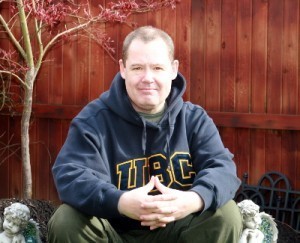 Michael Hiebert lives in British Columbia, Canada, up in the mountains where it’s cold and wet half the year and slightly hotter but still wet the rest of the year. He has three children and one of the fattest dogs anyone’s ever seen. Currently, he’s trying to cure his book addiction problem because his girlfriend has threatened to leave if he doesn’t. For Michael, it’s a tough call. Let’s just say it’s a work in progress.
Michael Hiebert lives in British Columbia, Canada, up in the mountains where it’s cold and wet half the year and slightly hotter but still wet the rest of the year. He has three children and one of the fattest dogs anyone’s ever seen. Currently, he’s trying to cure his book addiction problem because his girlfriend has threatened to leave if he doesn’t. For Michael, it’s a tough call. Let’s just say it’s a work in progress.Michael is well published under his own imprint, DangerBoy Books, and his first professionally published novel Dream with Little Angels will be released June 25 by Kensington Publishers in New York. It just received a starred review in Publisher’s Weekly. Check it out on Amazon!
Michael’s blog: www.michaelhiebert.com/blog
Twitter: @Hiebert_M
Facebook:https://www.facebook.com/michael.hiebert67
Email: michael.hiebert@aol.com
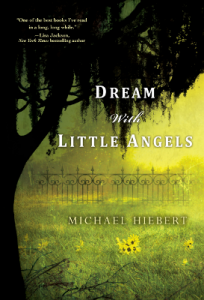
May 27, 2013
Giveaway Winners Announced!

I'd like to express my thanks to all who have subscribed to my official newsletter, thus making yourselves eligible for this, and all future giveaways. For this particular giveaway, we have a special top prize: a $25 Amazon.com gift certificate, and three ebook copies of TERMINUS.

The winners were selected by Random.org, and are:
1. Nora Downey: Amazon $25 gift certificate
The TERMINUS ebook winners are:
1. Kenneth Button
2. Sharon Skinner
3. Ann Ferri
I'll be getting in touch with you this week via the email address you used to subscribe.
Congratulations to the winners! And if you didn't win this time, don't worry, I'll be holding more giveaways in the not so distant future. If you've already subscribed to my newsletter, you're automatically entered for all future giveaways.
If you haven't already done so, please sign up here and encourage your friends to do so as well. Here's the easy to remember link: http://joshua-graham.com/newsletter
Thanks!
Josh
May 23, 2013
Another Giveaway!


It's that time again! I'm really excited about this one. I'm going to send a $25 Amazon.com gift certificate to one lucky person. I'm also giving away three copies of my latest book TERMINUS (ebook version).
All you need to do is:
1. Be on my newsletter mailing list.
If you've already subscribed to my newsletter, then you're already entered in the giveaway. If you're not sure, then subscribe again to make sure. If you have, it will let you know that you're already subscribed. To subscribe go to www.joshua-graham.com/newsletter and sign up.
2. "Like" my facebook page www.facebook.com/j0shgraham (if you already do, you're set!)
3. (Optional, but I'd sure appreciate it) Follow me on twitter: http://twitter.com/j0shuagraham (if you already do, you're set!)
4. (Optional, but I'd sure appreciate it) share this post with everyone you know on facebook, email, etc.
I'll announce the winners here on my blog on Monday, May 27, 2013.
Best wishes everyone!
Josh
May 15, 2013
Redeemable?

In a past life, when I was a director of operations in corporate America, one of the questions I always had to ask myself, when considering disciplinary action for an employee was: Is he redeemable? If so, I would work with his manager to create an action plan of improvement and accountability. If not, well...
Now, back it up several decades. When I was a kid (some time before the Civil War ;) ) life wasn't quite as convenient as it is today. This was before email, personal computers, microwave ovens, etc. While I didn't grow up in poverty, my family was not by any stretch of the imagination wealthy. I got lots of hand-me-downs, didn't have the latest toys, clothing, etc., and if anything I had broke, guess what? We didn't just throw it away and replace it. We mended it.
To that end, there were many patches sewn on my pants, lots of goopy glue used to seal the lips of my talking sneakers, and toys that were dented, dismembered, or otherwise maimed were regarded with special honor, their injuries like battle-scars.
Flash forward nearly half a century later: My kids have things that if they'd traveled back in time and shown us back then, would have violated Star Trek's Starfleet General Order 1, or The "Prime Directive." Kids these days have 3D handheld game consoles, app loaded iPads and smartphones (not my kids, not yet), toys and gadgets that would make our heads spin back in the 70s. Along with such advanced technology, they have instant access to information (the internet vs. the Dewey Decimal System), communication (mailing a letter to grandma vs. video chatting on Skype), and multimedia production (color printers for their school projects vs. crayons and pencils).
We're now able to produce things so quickly, and so efficiently that for products such as inkjet printers by EPSON, Cannon, or HP, it's gotten to the point that it's less expensive to buy a new color printer, than to get a couple of refills of color ink. But what is lost in all this advancement? Could it be the appreciation of long-term value? Do we look for instant replacement when something is broken or defective?
Let me give you an example from my son's hobby RC Model Airplanes/Jets. I have helped my son build, fly, and yes, even crash several planes and jets in the past year. Some of them seemed damaged beyond repair. They're not incredibly expensive to the point of being irreplaceable, but they are not so inexpensive so as to replace them as though they were an old toothbrush. So when we crashed our planes, we decided to see what would happen if we at least tried to repair them.
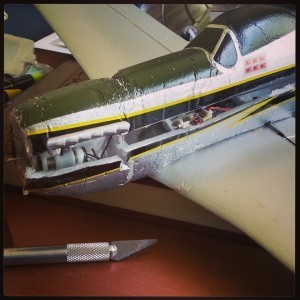
With some persistence, we got this damaged plane repaired.

But would it fly?
httpvh://youtu.be/I-tGrGBCBhw
Turns out, it flew even better, and my son learned more about its flight characteristics and what it was capable of.
So here is the our latest crashed jet, an F-22. Can it be repaired? Will it ever fly again?

All this got me thinking: What would my son have missed out on if we'd simply tossed his broken plane and replaced it with a new one? He'd not have learned the character of patience, nor would he have learned the value of redeeming rather than replacing. In our society today, too often we discard and replace broken things, and even relationships.
When couples have 'lost that loving feeling' too many choose divorce, rather than working on repairing and redeeming.
Even if we're not in a relationship, we might have given up on ourselves. In my book TERMINUS, there are three characters whose lives are so shattered they seem beyond redemption: Hope Matheson--a tormented suicidal woman, Jonathan Hartwell--a fallen preacher, and Carlito Guzman--a lethal cartel leader. It almost seems better for the world if they just followed their self-destructive paths. But who knows what redemptive value they might display if given the chance?
I am thankful that God doesn't have a toss-away attitude towards me, because I've been (and still am, to some degree) pretty broken and defective as a human being. No, He has a redeeming love for all His children, one that lovingly pieces me back together so that despite my scars, bent fuselage, and cracked wings, I can fly better than before.
But they that wait upon the Lord shall renew their strength; they shall mount up with wings as eagles; they shall run, and not be weary; and they shall walk, and not faint. --Isaiah 40:31
Do you have anything that your glad you've redeemed, repaired or restored, rather than discard?




